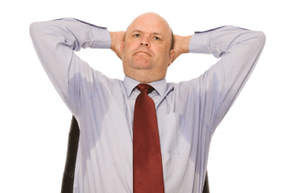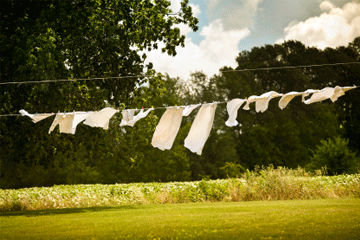One of the more common locations for sweat stains is on the collars of white dress shirts. While necks don't sweat quite as much as underarms do, even a small amount can be very evident on a starched, white collar.
Luckily, if your shirt is of a relatively hardy, washable fabric (like cotton), you have a whole lot of approaches you can try. They do not include chlorine bleach, since the chlorine can react with the proteins in sweat and make the stain darker. Instead, give one of these a shot:
Laundry detergent- Probably the easiest way to remove sweat stains is to use a liquid detergent formulated to treat protein-based stains (such as grass stains) and/or one that has something advertised along the lines of "oxygen cleaning power." Apply it undiluted to the stain and let it sit for about 30 minutes before washing.
Lemon juice- Before washing, combine equal parts lemon juice and water, and scrub until the stain is gone.
Vinegar - Add 2 tablespoons of white vinegar to 1 cup of water, and apply to the stain. Let it sit for 30 minutes before washing. (And don't even think of using any other vinegar type but white.)
Salt - Add 1 tablespoon of salt to 1 cup of water, and sponge the solution into the stain until it's completely gone. Then wash.
Baking soda - Combine 4 tablespoons of baking soda and 1/4 cup of water. Dab on the stain until it's gone, and then wash.
Ammonia - Dilute ammonia with an equal amount of water, and pour onto the stain. You don't need to let it sit before washing, just toss it in.
Hydrogen peroxide - Dilute hydrogen peroxide with an equal amount of water, apply to the stain, and let sit for 30 minutes before washing. Don't use hydrogen peroxide on colors, as it does have some bleaching qualities.
Hopefully, your first attempt at sweat-stain removal will succeed. If it doesn't, just work your way through the list until you find something that works (washing in between each method).
If you find your perspiration stain isn't fully responding to these methods, you may have to take your methods up a notch. Underarm stains, for instance, can be tougher to remove than collar stains, since there's typically more sweat soaking in and antiperspirants can make the stain worse. For especially stubborn sweat stains, you'll need to slightly shift your approach.



